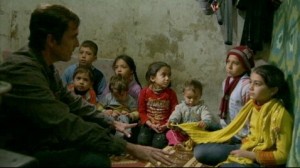 The United Nations official responsible for aiding Syrian refugees painted his bleakest picture to date Tuesday, describing a humanitarian crisis that is “dramatic beyond description” and a country and people so destroyed that they could take years to recover under the best of circumstances.
The United Nations official responsible for aiding Syrian refugees painted his bleakest picture to date Tuesday, describing a humanitarian crisis that is “dramatic beyond description” and a country and people so destroyed that they could take years to recover under the best of circumstances.
In addition to 3.6 million people internally displaced by Syria’s civil war, registered refugees in the four neighboring countries now total 1.1 million, compared with just 33,000 last April, U.N. High Commissioner for Refugees Antonio Guterres said in congressional testimony. At least half a million more who have fled Syria are unregistered, he said.
By the end of this year, Guterres said, his organization expects 1 million refugees each in Turkey, Jordan and Lebanon, a situation that will have “an unimaginable impact on the economy, the society and the security of these countries.”
Guterres’s remarks came on a day when signs of restlessness surfaced in Washington over the two-year-old stalemate in Syria’s civil war, which has killed more than 70,000 people. Influential senators suggested a possible no-fly zone in northern Syria and proposed stepped-up U.S. training for rebel forces.
Guterres said that, despite significant international aid both promised and delivered, the money is far short of what’s needed. “UNHCR and its partners have received less than 30 percent of the funding we need to assist the current number of refugees, let alone those who are yet to come,” he said. “There is no way a gap of this magnitude can be filled with existing humanitarian budgets.”
State Department officials presented a similar portrait at the hearing, held by a subcommittee of the Senate Foreign Relations Committee. The United States has contributed $385 million in humanitarian aid to Syria and about $110 million in nonlethal support to opposition groups.
The witnesses deflected questions calling for assessments of the opposition and opinions on whether the Obama administration should intervene with arms shipments to the rebels or with air power.
In remarks at the Council on Foreign Relations, Senate Armed Services Committee Chairman Carl Levin (D-Mich.) said President Obama’s goal of organizing a political alternative to Syrian President Bashar al-Assad is the right objective. But he suggested the need for possible additional action.
“I would go somewhat further than the president,” Levin said. “I would, for instance, help Turkey, if they’re willing — and I think they are — to establish a protected zone along the Turkish-Syrian border. . . . [I] would go after some Syrian air defenses and after some of the Syrian air power.”
At a separate hearing held by Levin’s committee Tuesday, Sen. John McCain (R-Ariz.) asked NATO’s military chief, Adm. James G. Stavridis, whether it is time for the United States to “help the Syrian opposition in ways that would break what is a prolonged civil war.”
“My personal opinion,” Stavridis said, “is that would be helpful in breaking the deadlock and bringing down the Assad regime.”
But there is no consensus. On Monday, Gen. Martin Dempsey, chairman of the Joint Chiefs of Staff, dismissed the role of military action during a talk at the Center for Strategic and International Studies. “I don’t see a military option that would create an understandable outcome, and until I do, my advice would be to proceed cautiously,” he said.
The Obama administration has said it fears that sophisticated weapons sent to the rebels might fall into the hands of Islamic extremists fighting on their side. While some senior officials, including Secretary of State John F. Kerry, have noted major improvements in opposition organization, Dempsey said he does not see it.
“About six months ago, we had a very opaque understanding of the opposition, and now I would say it’s even more opaque,” he said.
At a news conference Tuesday, Sens. Robert P. Casey (D-Pa.) and Marco Rubio (R-Fla.) introduced legislation authorizing the president to provide special-operations training to vetted members of the opposition Free Syrian Army. The bill also would authorize Obama to provide nonlethal equipment and training to deal with chemical weapons and “to improve [rebels’] ability to conduct operations and provide security for convoys of humanitarian assistance inside Syria.”
Rep. Eliot L. Engel (D-N.Y.) introduced legislation in the House on Monday that would authorize Obama to provide the rebels with “lethal equipment.”
Washington Post

Leave a Reply
You must be logged in to post a comment.